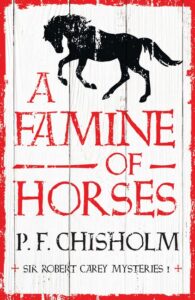The same friend who, ages ago, recommended I read Dorothy Dunnett suggested I pick up books by P.F. Chisholm, and this is how bookish friendships are sustained over decades. We don’t always like the same things — Little, Big left her cold — but she seldom goes astray when she says she thinks I will like something. I hope the recommendations I have made in return have been similarly rewarding, because A Famine of Horses was a bang-up winner. I started it while waiting for a flight out of Larnaca and had finished it by the time I landed in Berlin
Sir Robert Carey has accumulated debts and probably enemies at the court of Elizabeth I, and he says more than once that his appointment as Deputy Warden of the Marches has saved his life. Given the violence and uncertainty of the Marches — the parts of England bordering Scotland — that is quite a statement about his situation in London. Why Carey was so keen to leave London is never completely explained, though there are hints about problems with both money and women. The novel never slows down enough to explore Carey’s past, for he has not so much been thrown in at the deep end as dived in with rolls and twists that nobody in those parts has seen before.
Even before he arrives in Carlisle he has an enemy in Sir Richard Lowther, who believes that the office had been promised to him, and who is the beneficiary of much of the corruption across the whole of the Western Marches. As Carey is approaching, the man who will be his sergeant and a small troupe discover a dead body hidden in a grouse stand. Dead men are common enough in the Marches, but this particular corpse was that of Sweetmilk Graham, youngest son and favorite of the powerful Graham patriarch, Jock of the Peartree. Worse luck, Sergeant Dodd and his men are soon surrounded by Grahams interested in the shrouded body carried by one of the horses. Dodd is economical with the truth, and insists that he’s on the Warden’s business and will brook no interference. The semi-bluff works, but sets up repercussions that will echo throughout the novel as connections and loyalties flow back and forth, and the law proves a most malleable ideal.
Carey has to establish himself in Carlisle, find out who killed Sweetmilk, and somehow survive all of the potentially deadly scrapes that the complex situation and his own nature get him into. He’s not without advantages: He grew up in the country and knows much more than the Marchers expect from a Londoner. He’s experienced in battle and knows how to build loyalty both in the field and behind the scenes. He’s had the wits to thrive in the cutthroat atmosphere of Elizabeth’s court, so the power plays in the provinces seldom surprise him. In an echo of the Elizabethan era, some of the powerful women of the Marches are on his side and, unlike most of his opponents, Carey knows better than to dismiss their abilities. On the other hand, he’s barely part of the local system, and many people would just as soon see him depart the scene one way or another so that they may continue in their accustomed roles and feuds. He’s also reckless, and overly confident that he can get out of any situation. Carey knows what pride goeth before, but he cannot help himself. Finally, he has firm beliefs about law and justice, and they do not accord with the customs of the borderlands.
The best thing about A Famine of Horses is its blistering pace. Chisholm sets the scenes with minimal but effective description and carries her story forward with well-chosen dialog and clearly depicted action. The whole story, except for a final chapter that’s more of a coda, takes place within a week. Raiding and reiving are commonplace in the Western Marches, but Carey’s arrival and activities change the tempo entirely. By his eighth day — the seventh having been by no means one of rest — quite a bit of dust has been shaken out of the customary practices in and around Carlisle, with repercussions likely to reach the Scottish King James.
The second best thing about A Famine of Horses is how Chisholm shows the complex and interlocking set of relationships among the characters and their family connections. Set out in a list or a review — one of Carey’s men is a young Graham; his sergeant’s wife is an Armstrong, and if the Grahams carry out Jock of the Peartree’s threat against her they will have to reckon with her kin; Carey himself is the son a border lord notorious for having burned many of his enemies’ holdings — they could easily confuse or overwhelm a reader. In Chisholm’s hands, these connections shape the characters’ choices in perfectly understandable ways. They have to weigh not only the person immediately present, but the unseen families behind them at all times. Carey keeps most of it straight in his mind, but even he gets exasperated some times, as when he discovers that the mistress of a bawdy house shares a surname with an important local official. No relation, as it turns out.
The next best thing about A Famine of Horses is seeing a core of characters coalesce around Carey. There are eight more books in Sir Robert’s story, and I enjoyed the anticipation of future escapades as I observed him build a bond with Sergeant Dodd, and start to form his unruly band into an effective unit. Carey’s servant Barnabus is also a delight, an unsavory counterpart, master of card-sharping and dice-rolling, and familiar with the ways of crime. He’s true to Carey, but keenly aware of his master’s shortcomings, and a man of his own considerable resources. I’m looking forward to seeing what else he can do.
A Famine of Horses is a terrific, feverishly fast adventure on its own and, I hope, a great start to a solid series.
+++
I read A Famine of Horses as part of the omnibus volume Guns in the North, which is more readily available these days. The next book in Sir Robert Carey’s story is A Season of Knives, and it starts the very next day after the first book’s end.



1 pings
[…] in the North, which is more readily available these days. Its story begins the day after the end of A Famine of Horses. The next book in Sir Robert Carey’s story is A Surfeit of Guns, and it starts about […]